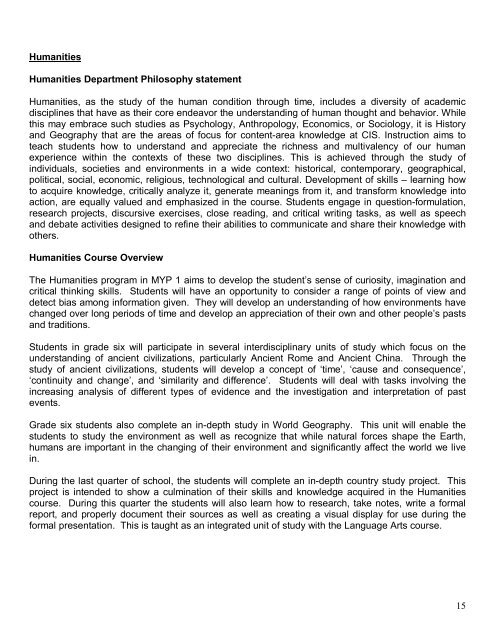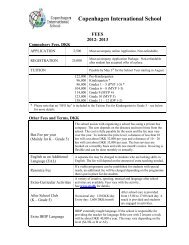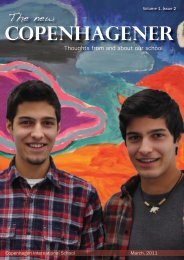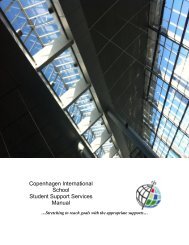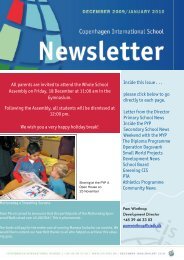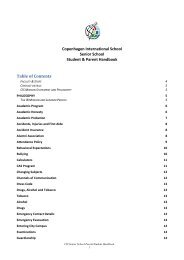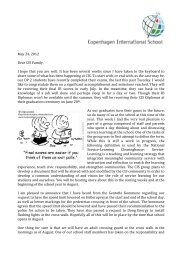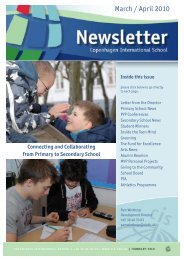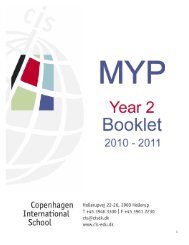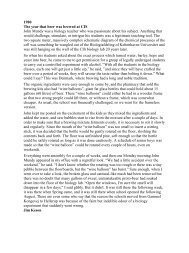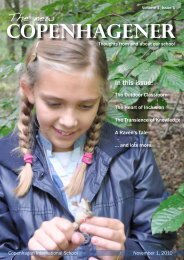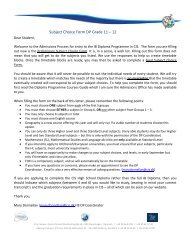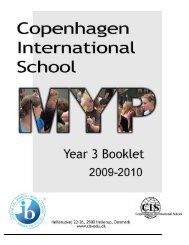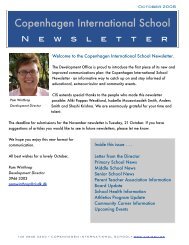German B - Copenhagen International School
German B - Copenhagen International School
German B - Copenhagen International School
You also want an ePaper? Increase the reach of your titles
YUMPU automatically turns print PDFs into web optimized ePapers that Google loves.
Humanities<br />
Humanities Department Philosophy statement<br />
Humanities, as the study of the human condition through time, includes a diversity of academic<br />
disciplines that have as their core endeavor the understanding of human thought and behavior. While<br />
this may embrace such studies as Psychology, Anthropology, Economics, or Sociology, it is History<br />
and Geography that are the areas of focus for contentarea knowledge at CIS. Instruction aims to<br />
teach students how to understand and appreciate the richness and multivalency of our human<br />
experience within the contexts of these two disciplines. This is achieved through the study of<br />
individuals, societies and environments in a wide context: historical, contemporary, geographical,<br />
political, social, economic, religious, technological and cultural. Development of skills – learning how<br />
to acquire knowledge, critically analyze it, generate meanings from it, and transform knowledge into<br />
action, are equally valued and emphasized in the course. Students engage in questionformulation,<br />
research projects, discursive exercises, close reading, and critical writing tasks, as well as speech<br />
and debate activities designed to refine their abilities to communicate and share their knowledge with<br />
others.<br />
Humanities Course Overview<br />
The Humanities program in MYP 1 aims to develop the student’s sense of curiosity, imagination and<br />
critical thinking skills. Students will have an opportunity to consider a range of points of view and<br />
detect bias among information given. They will develop an understanding of how environments have<br />
changed over long periods of time and develop an appreciation of their own and other people’s pasts<br />
and traditions.<br />
Students in grade six will participate in several interdisciplinary units of study which focus on the<br />
understanding of ancient civilizations, particularly Ancient Rome and Ancient China. Through the<br />
study of ancient civilizations, students will develop a concept of ‘time’, ‘cause and consequence’,<br />
‘continuity and change’, and ‘similarity and difference’. Students will deal with tasks involving the<br />
increasing analysis of different types of evidence and the investigation and interpretation of past<br />
events.<br />
Grade six students also complete an indepth study in World Geography. This unit will enable the<br />
students to study the environment as well as recognize that while natural forces shape the Earth,<br />
humans are important in the changing of their environment and significantly affect the world we live<br />
in.<br />
During the last quarter of school, the students will complete an indepth country study project. This<br />
project is intended to show a culmination of their skills and knowledge acquired in the Humanities<br />
course. During this quarter the students will also learn how to research, take notes, write a formal<br />
report, and properly document their sources as well as creating a visual display for use during the<br />
formal presentation. This is taught as an integrated unit of study with the Language Arts course.<br />
15


